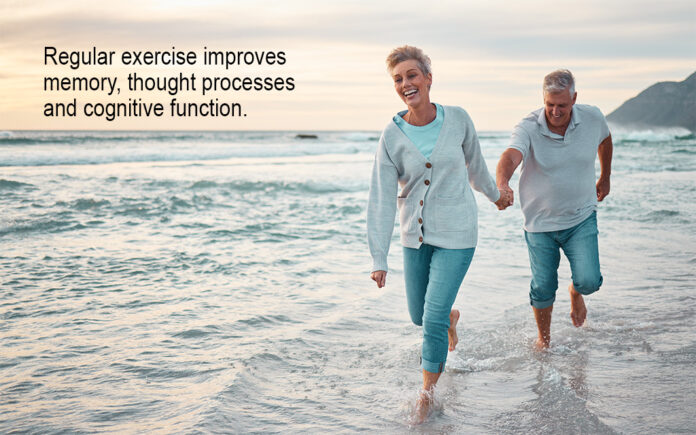I reviewed the significant benefits of a plant-based diet in preventing dementia in a previous article. It pointed to the fact that people living with cardiovascular disease, obesity and diabetes are at a much higher risk of developing Alzheimer’s disease than those without these chronic health conditions.
Science acknowledges that a whole-food, plant-based way of eating can help you manage and overcome these chronic conditions and, therefore, plays a large role in preventing or slowing the development of dementia.
Another tool at your disposal in the fight against dementia is exercise. Quite simply, exercise and a plant-based diet are perfect combinations for optimal cognitive health.
The results are in
Several studies clearly demonstrate that regular exercise improves memory, thought processes and cognitive function. Therefore, exercise plays a vital role in your dementia prevention strategy.
The National Ageing Research Institute Ltd (NARI) state that fewer than a quarter of older adults are getting enough physical exercise to achieve improved health outcomes. This means that less than 25 per cent of older adults are participating in adequate amounts of exercise.
Now that’s shocking!
Most people are not clear on where to start and are left wondering, “What’s the best exercise to do to keep Alzheimer’s disease at bay and improve my health?”
Alzheimer’s Society UK discuss a study of 716 participants with an average age of 82. The study found that those who were in the bottom 10%, based on the amount of daily physical activity, were more than twice as likely to develop Alzheimer’s disease when compared to the top 10% who were physically active every day.
The Finnish Twin Cohort study tracked 3000 twins at mid-life from 1975 and 1981 and then followed up with the twins again between 1999 and 2015 to investigate cognition levels as they became older adults. The results showed that participating in moderate intensity physical activity (meaning more than a strolling walk) during midlife and beyond yielded a lower risk of cognitive impairment than in those who were sedentary.
So, What Is “Moderate Intensity Physical Activity”?
The World Health Organization (WHO) states that moderate-intensity physical activity “requires a moderate amount of effort and noticeably accelerates the heart rate.”
The WHO adds that this type of activity includes dancing, gardening, brisk walks, housework, being active with children and domestic animals, general home handyperson tasks like painting, and moving or carrying loads of less than 20kg.
Moderate-intensity physical activity is also known as a “cardio workout” or “aerobic exercise.” This means you are increasing your oxygen intake as your heart rate and breathing patterns increase.
Running, team sports, fast swimming and fast cycling are known as “vigorous-intensity physical activity” and are also beneficial for maintaining great physical and cognitive health as you age. However, studies have not differentiated between moderate and vigorous intensity exercise, nor whether one is better at minimising your risk of developing dementia than the other.
Is walking enough
The University of Pittsburgh in North America published its findings from an ongoing 20-year study of the effects of walking and cognitive health. Dr Raji and his team observed 426 participants over 20 years. They analysed the relationship between walking and changes in brain structure.
After ten years the participants underwent an MRI to check for changes in the brain’s volume. A shrinking brain volume is indicative of brain cells dying. The findings of the study showed that those with greater brain volume were also the ones who were the most physically active.
How much walking did they do?
Well, they walked just shy of 10km per week for the duration of the study. Simply by walking at a moderate pace, they maintained their brain volume and greatly reduced their risk of cognitive decline. Currently, there is no cure for Alzheimer’s disease, and expensive trials and treatments are providing inconsistent results. Dr Raji states, “Alzheimer’s is a devastating illness, and unfortunately, walking is not a cure. But walking can improve your brain’s resistance to the disease and reduce memory loss over time”.
Now, that is great news.
Get your walking shoes on!
Your brain controls everything that happens within you. Internal and external, physical, emotional – nothing happens without your brain. Imagine if you could keep your brain firing on all cylinders with a simple and cost-effective strategy: Good old-fashioned exercise.
To give your brain the best chance to age well, you must nourish it with whole plant foods, and move your body to get the heart pumping, every single day. Your brain will love you for it.
If you are not able to walk, it could be very useful to contact a physiotherapist or personal trainer who can advise you on the best type of aerobic activity to suit you. That way you can experience all the benefits of exercise, raise your heart rate and boost your cognitive function.
Next time you read a headline that fast-paced walkers are less likely to develop Alzheimer’s disease, you know there is definitely truth to that statement. So, what are you waiting for? Get those walking shoes on and get moving.






